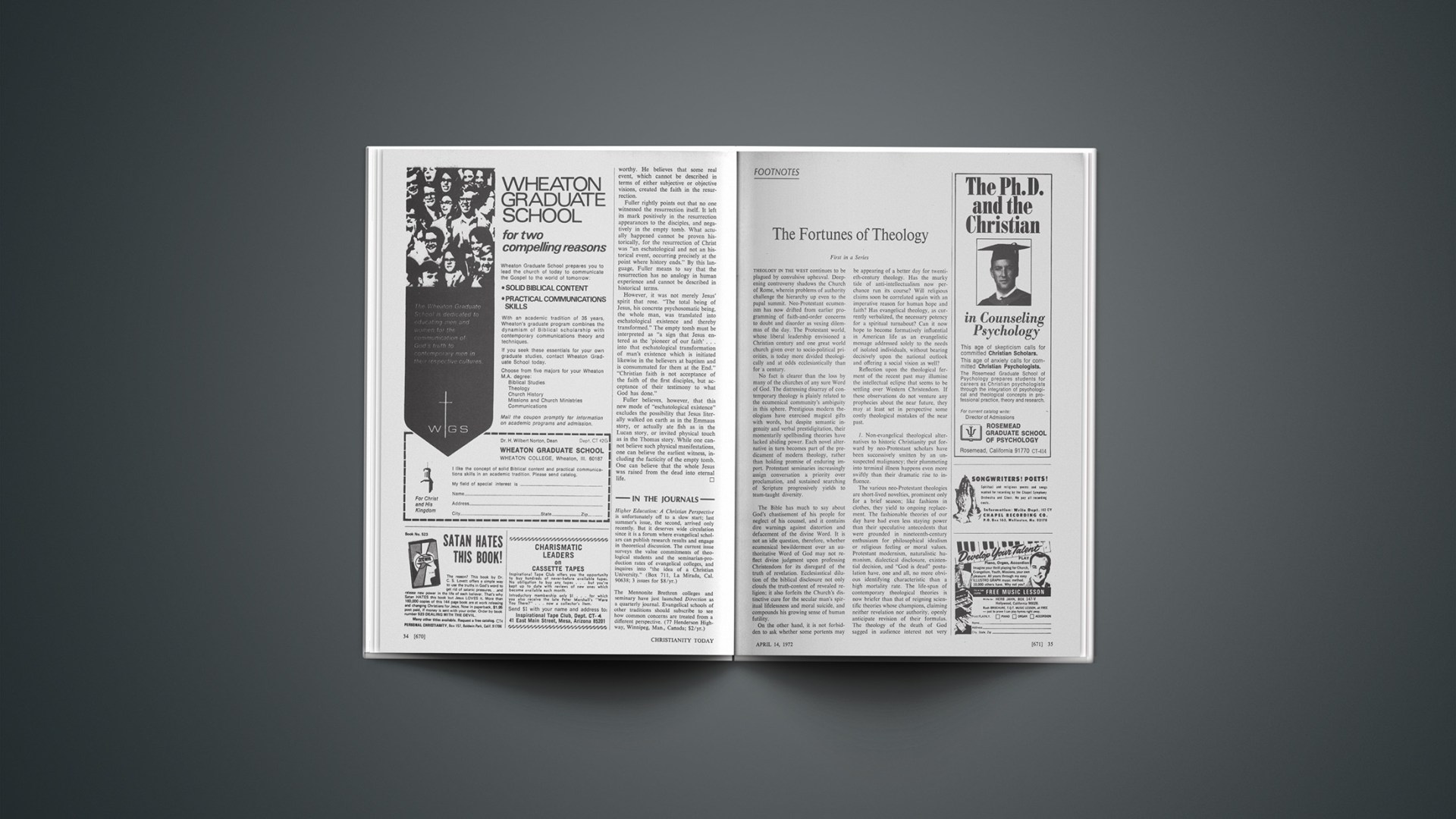First in a Series
Theology in the west continues to be plagued by convulsive upheaval. Deepening controversy shadows the Church of Rome, wherein problems of authority challenge the hierarchy up even to the papal summit. Neo-Protestant ecumenism has now drifted from earlier programming of faith-and-order concerns to doubt and disorder as vexing dilemmas of the day. The Protestant world, whose liberal leadership envisioned a Christian century and one great world church given over to socio-political priorities, is today more divided theologically and at odds ecclesiastically than for a century.
No fact is clearer than the loss by many of the churches of any sure Word of God. The distressing disarray of contemporary theology is plainly related to the ecumenical community’s ambiguity in this sphere. Prestigious modern theologians have exercised magical gifts with words, but despite semantic ingenuity and verbal prestidigitation, their momentarily spellbinding theories have lacked abiding power. Each novel alternative in turn becomes part of the predicament of modern theology, rather than holding promise of enduring import. Protestant seminaries increasingly assign conversation a priority over proclamation, and sustained searching of Scripture progressively yields to team-taught diversity.
The Bible has much to say about God’s chastisement of his people for neglect of his counsel, and it contains dire warnings against distortion and defacement of the divine Word. It is not an idle question, therefore, whether ecumenical bewilderment over an authoritative Word of God may not reflect divine judgment upon professing Christendom for its disregard of the truth of revelation. Ecclesiastical dilution of the biblical disclosure not only clouds the truth-content of revealed religion; it also forfeits the Church’s distinctive cure for the secular man’s spiritual lifelessness and moral suicide, and compounds his growing sense of human futility.
On the other hand, it is not forbidden to ask whether some portents may be appearing of a better day for twentieth-century theology. Has the murky tide of anti-intellectualism now perchance run its course? Will religious claims soon be correlated again with an imperative reason for human hope and faith? Has evangelical theology, as currently verbalized, the necessary potency for a spiritual turnabout? Can it now hope to become formatively influential in American life as an evangelistic message addressed solely to the needs of isolated individuals, without bearing decisively upon the national outlook and offering a social vision as well?
Reflection upon the theological ferment of the recent past may illumine the intellectual eclipse that seems to be settling over Western Christendom. If these observations do not venture any prophecies about the near future, they may at least set in perspective some costly theological mistakes of the near past.
1. Non-evangelical theological alternatives to historic Christianity put forward by neo-Protestant scholars have been successively smitten by an unsuspected malignancy; their plummeting into terminal illness happens even more swiftly than their dramatic rise to influence.
The various neo-Protestant theologies are short-lived novelties, prominent only for a brief season; like fashions in clothes, they yield to ongoing replacement. The fashionable theories of our day have had even less staying power than their speculative antecedents that were grounded in nineteenth-century enthusiasm for philosophical idealism or religious feeling or moral values. Protestant modernism, naturalistic humanism, dialectical disclosure, existential decision, and “God is dead” postulation have, one and all, no more obvious identifying characteristic than a high mortality rate. The life-span of contemporary theological theories is now briefer than that of reigning scientific theories whose champions, claiming neither revelation nor authority, openly anticipate revision of their formulas. The theology of the death of God sagged in audience interest not very long after a major denominational publishing house had rearranged its book publication schedule to focus on the God-is-dead thought.
The short life expectancy of the distinctively modern theories of theology is therefore one of their most evident traits. All influential neo-Protestant theologians of the twentieth century have lived to see a widespread acceptance and abandonment of their formative frontier expositions.
2. Diagnosis of these neo-Protestant views—from the theology of a thundering other-worldly dialectical Word to that of an explosive this-worldly God of revolutionary violence, or the more timid process-theology deity given to collective bargaining—discloses, amid their transientness, a developmental pattern common to them all. Their undergirding rationale involves a three-step maneuver in respect to the Bible.
First, a given theologian isolates for ridicule (as intellectually intolerable, or as a vestigial remnant of the prescientific past) those aspects of the scriptural account that his system aims to replace (e.g., for Barth, divinely revealed truths claiming objective validity; for Bultmann, supernatural reality and miracle; for Ogden, God’s transcendent revelation in Jesus Christ the Word; for Van Buren, the transcendently divine).
Second, Jesus Christ is appealed to as validating the non-evangelical alternative manufactured by the contemporary savant. The prestige of the prophetic-apostolic witness and of the Reformation heritage is then likewise arrogated to the newly minted theory.
Finally, having stripped the Bible of controlling contrary elements by dismissing them as mythical or marginal, the contemporary theologian asserts that what is left of Scripture teaches or supports the new view. The modern speculations are therefore freely depicted as biblical, and as expressing either the highest emphasis, or the real doctrine, or the intention, of the sacred writers. [To be continued.]
CARL F. H. HENRY










